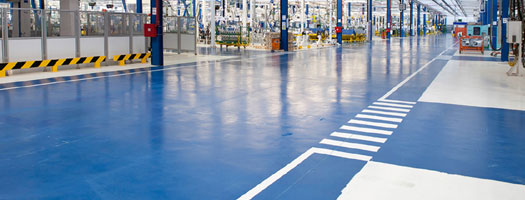Epoxy Flooring Coating
Epoxy involves the application of two liquid components– a polyepoxide resin and a curative – that chemically bond together. When mixed and applied properly, the resulting chemical reaction creates a very hard surface and very strong bond.
Epoxy is safe for a variety of industries. This floor coating is stain-resistant, chemical-resistant, durable and provides luster and even beauty to many industrial settings
The surface coating protects concrete flooring from the day-to-day wear and tear that can degrade concrete over time. Businesses with epoxy coatings often spend less money on flooring over time.
Epoxy coatings offer different benefits depending on the type and style you choose. To help you sort out the differences, here are 8 types of epoxy floor coatings for use in your home or business.
- Epoxy-Flaked Floor Coatings: these include chip and quartz floor systems, which are not quite epoxy flooring as much as they are a style choice for epoxy coating applications. Using this method, contractors add multi-colored flakes or chips while the coating is wet in order to achieve a decorative finish.
- Waterproofing Epoxy Systems: Applying moisture vapor barriers over concrete flooring in order to create an impenetrable, waterproof surface. An added benefit is it brings the transmission of vapors to zero. Typically, vapor barrier epoxy coatings are added before the final flooring option whether vinyl, carpet, hardwood or tile.
- Self-Leveling Epoxy Overlays: this coating method easily installs over new or existing concrete floors to achieve a smooth, seamless floor. Property owners commonly apply self-leveling coatings in office buildings, garages, kitchens, dining rooms and warehouses.
- Anti-Static Flooring: used in specialized applications, this coating is designed to work where a static-free environment is needed, typically where sensitive electronics are in use or in facilities such as tech manufacturing plants, laboratories and hospitals.
- Non-Slip Epoxy Floors: contractors use this common epoxy coating in areas where there is heavy foot or forklift traffic. This method offers good strength and durability. They add quartz sand to self-dispersing epoxy and apply it on floors in food processing centers and in other businesses where liquid is present to achieve slip resistance.
- Gravel Coatings: a decorative epoxy option, gravel coatings make an ideal flooring choice for adding artistic designs, logos or branding directly on the floor. Great for entryways.
- Metallic Epoxy Coatings: latest trend in decorative concrete, metallic coatings add a shiny patina and stunning 3D effect to floors. Made of 100%-solids epoxy and blended with metallic pigments, these coatings are self-leveling to create a seamless floor that becomes the focal point of residential or commercial designs.
- Chemical Resistant Industrial Epoxy Coatings: industrial facilities typically need this specialized epoxy to protect floor surfaces and workers from chemical spills. These epoxy coatings offer long-lasting chemical resistance and non-slip features for chemical processing plants, paper mills, pharmaceutical labs, mining operations and other industrial facilities.














